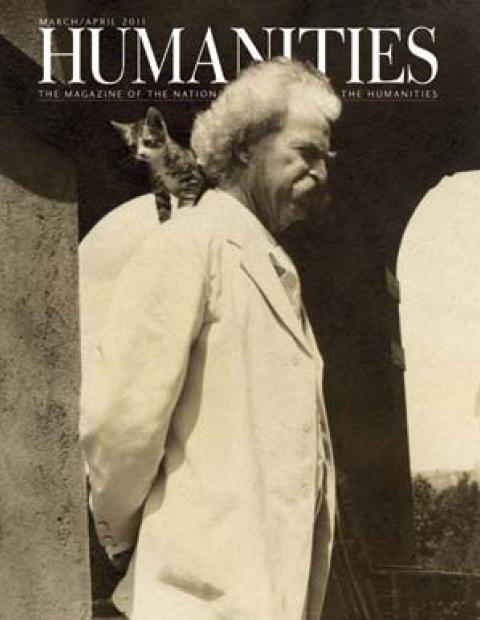In this issue, we honor the 2010 Humanities Medalists. As these ten extraordinary writers and scholars prepare to visit the White House, HUMANITIES magazine talks with them and briefly tours their distinctive careers in American letters, the study of history, cultural studies, academic leadership, and literary scholarship.
From this rooftop scan of high points in the humanities, we go to a closer look at a single publication of one of the many important scholarly papers projects funded by NEH: volume one of Mark Twain’s Autobiography. There could hardly be anyone more appropriate than Jerome Loving to write about this best-seller for us.
From Loving’s NEH-supported biography, Mark Twain: The Adventures of Samuel L. Clemens, we recently excerpted a chapter in which the great American comic was found making light of Emerson, Longfellow, and Holmes—the most respected names in nineteenth-century American literature—to their faces, at a birthday party for John Greenleaf Whittier. Now, Loving takes a look at Twain’s own book on Twain.
It is also the job of HUMANITIES to attempt to put into words scholarship that is not yet well known or even well understood. Under such orders, James Williford was sent to report on the doings on Lev Manovich, the pioneering, Russian-born professor of visual arts at the University of California–San Diego. Everywhere else there is the feeling that more can be learned from the close study of documents and artifacts. But what of the visualization of documents and artifacts, arrayed like a mural across a wall of computer monitors?
It is, however, to the small screen that Andrew Ferguson, the ironical political commentator and Lincoln buff, looks for the image of a modern-day Plutarch. This he finds in a documentary about Alexander Hamilton led and hosted by Richard Brookhiser.
Anna Maria Gillis also takes her assignment from a new documentary, this one on John Muir, reviewing the life and career of a young tinkerer-turned-explorer who found his life’s purpose in the great outdoors.
Also in this issue, there is the amazing story of how Herbert Hoover and American aid saved a vast number of Russian lives in the early days of the Soviet Union, and a Q & A on the philosophy and flute-playing of Arthur Schopenhauer.

